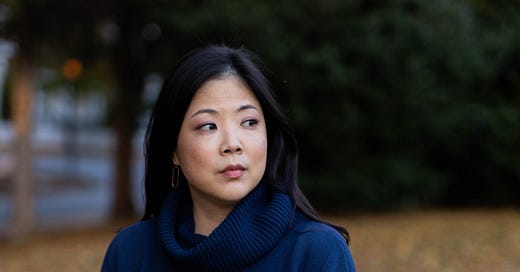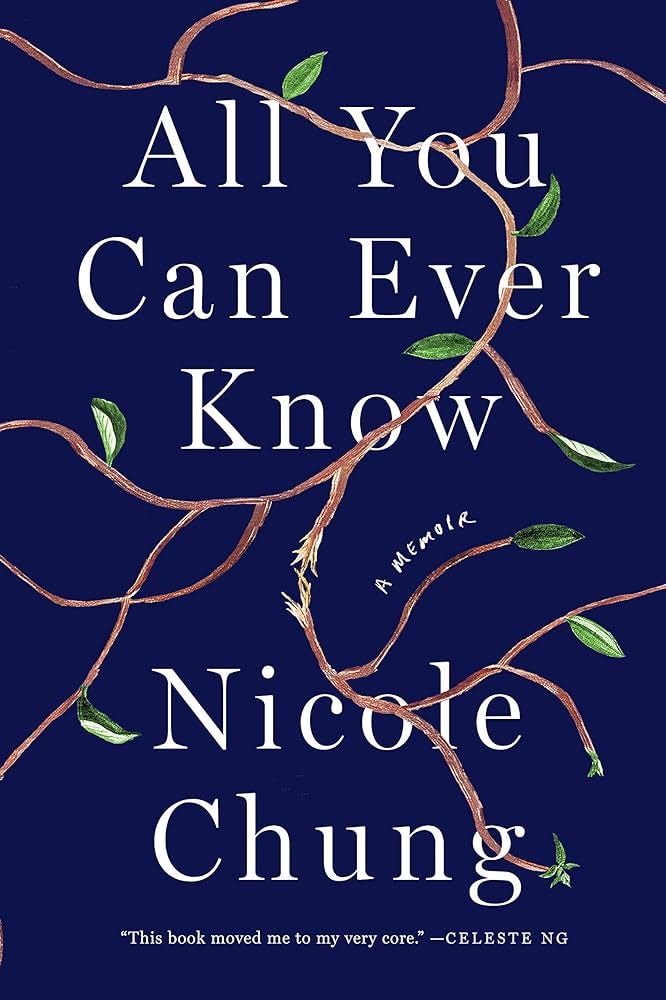Five Questions with Memoirist Nicole Chung
We talk about life after publishing something personal
Years ago, I saw Nicole Chung in conversation with Jasmine Guillory, one of the reigning queens of contemporary romance, at East City Bookshop. The conversation was so smart and interesting that I immediately bought a copy of her debut memoir All You Can Ever Know. Since then, I’ve become a Nicole Chung superfan, read All You Can Know at least twice (including once sitting on the floor after packing up my old apartment) and devoured her new memoir, A Living Remedy.
All this is to say, I was delighted when Nicole agreed to an interview. In addition to her two books, she’s the former editor-in-chief of Catapult magazine and the co-editor of a new YA anthology of adoptee stories, When We Became Ours. She also writes a fabulous newsletter. Our conversation has been edited and condensed for clarity.
Tell us a little bit about A Living Remedy.
It’s one of those books that has defied easy description. I noticed I can sum up my first book in a sentence, but this one is trickier. It’s very much a grief memoir and, in many respects, it’s also about class and race. It’s about leaving home.
When I began it originally, I was reckoning with my grief from my father who died the year my first book came out, and that we lost him too young. He was 67 years old and had type two diabetes. It would have been treatable if he’d access to the health care he needed for years. I had imagined that A Living Remedy would focus on my grief for him and the injustice of how he died. I never imagined I would end up writing about losing both my parents in a two-year span. My mother was diagnosed with terminal cancer shortly after I started writing.
I put it down for a long time and when I picked it back I up, I realized the story had changed tremendously. I had changed. The world had changed – I wrote it in the early months of the pandemic.
But really, it's about the different ways we belong to each other. It's about the distance between us and home. It came from this desire to capture what I was feeling and going through in the moment.
Both of your books are hyper specific to your experience and have a universal feeling. How do you pull that off?
So often with memoir especially, it’s in the specificity of the experience where we find meaning as readers. When I read works by other writers, fiction as well as nonfiction and poetry, I’m not necessarily looking for books about exactly what I’ve experiences but I’m looking for stories that will make me feel something, and make me reflect on not just what they’re writing about but things that have happened to me. I think one way memoir justifies its existence is meeting readers where they are and hopefully encouraging them to think about their own experiences, their own lives and their own losses.
One of the main things I’m trying to do with everything I write is to have it be good company for a reader, whatever they’re going through. But of course, that’s especially true if they’ve experienced anything like what I’ve been writing about.
I’m always curious about what it’s like living in a world after you publish a book this personal.
I’ve had the experience twice now, which surprises me a lot. I don’t know that I’d write a second one at all, let alone on the heels of the first. But I think I’ve been helped by the fact that this isn’t my first rodeo. Even before the first book came out, I had published a number of essays, some of them quite personal. So, I was prepared as one could be for the experience of having something so intimate and personal out in the world.
It's an interesting of experience having people who know me very much outside of my careers, read one of my books. Sometimes their response is ‘Wow, that was a lot about you.’ And, it’s true, but I think I have very good boundaries as a writer. One of the things I’ve learned over the years is how to share about my life and how to do that in a way that respects my own privacy and, hopefully, the privacy of the people I care about.
I have an extensive editing process and one of the things I really make sure of before a book or an essay is ‘am I okay with that I shared.’ Over the years, I’ve figured out as part of the revision and publication process of where those lines are for me.
What can you share about When We Become Ours?
It’s a young adult anthology. I wrote one story in it, but the other stories are all by fellow writers. They’re all adoptees like me and my co-editor Shannon Gibney is a fellow transracial adoptee and author. I’m really excited by it. As far as we know, it’s the first collection of its kind.
There is a real shortage of adoptee representation and the few examples we could think of, almost all of them are not actually by adoptees.
What I hope is just like the first of its kind. I would love to see every author in this anthology have a chance to l write their own full-length book many, many already have.
Lastly, any books you want to recommend?
I’ve been doing sort of an Agatha Christie reread. I recently read the Electra McDonnell series by Ashley Weaver. They’re set during World War II. She’s a safecracker using her skills to help solve murders on the homefront during the War. I have a real weakness for British murder mysteries.
My friend Jasmine Guillory recommended to me mysteries by Elly Griffiths. So, I’ve been my working my way through that series. It’s been so long since I got knee-deep into a new mystery series. I’ve been enjoying it.
I’ve also been reading a lot of climate nonfiction lately. I recently finished The Great Displacement by Jake Bittle. It’s a look at climate-caused movement and migration in the U.S. specifically. That was really good. I’m ready Elizabeth Rush’s books also. Rising: Dispatches from the New American Shore is the one I’m reading now.
Thanks again to Nicole for chatting. You can buy her books here, find her on Bluesky, Instagram and Twitter and subscribe to her newsletter.
What to Read If is a free weekly book recommendation newsletter. Need a rec? Want to gush about a book? Reply to this email, leave a comment or find me on Twitter @elizabethheld or Instagram.
If you're reading this on Substack or were forwarded this email, and you'd like to subscribe, click the button below.
Disclosure: I am an affiliate of Bookshop.org and I will earn a commission if you click through and make a purchase.







Just. Love. This: "One of the main things I’m trying to do with everything I write is to have it be good company for a reader, whatever they’re going through"
Can't wait to read A Living Remedy...
Nicole Chung's grasp of what makes memoir work best is why I read her. She has also shown enormous generosity and compassion to writers in her work with the Atlantic. Finally, I love -- absolutely adore -- Peggy and how the arrival of that puppy into Nicole's life opened a way for her to keep a finger on joy as she endured all those losses and then wrote about them with such grace. Loved this brief interview with her. Thank you @Elizabeth.